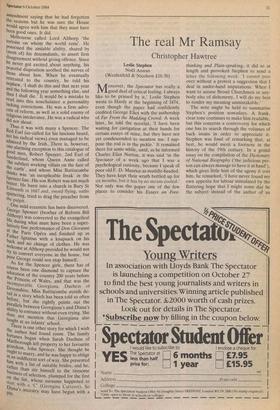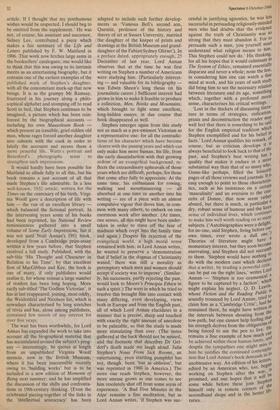The real Mr Ramsay
Christopher Hawtree
Leslie N0SAt en pn ha enn
(Weidenfeld & Nicolson £16.50)
'Moreover,the Spectator has really a good deal of critical feeling. I always like to be praised by it,' Leslie Stephen wrote to Hardy at the beginning of 1874, even though the paper had confidently credited George Eliot with the authorship of Far From the Madding Crowd. A week later, he told the novelist, 'I have been waiting for castigation at their hands for certain essays of mine, but they have not yet condescended to mention me. I sup- pose the rod is in the pickle.' It remained there for some while, until, as he informed Charles Eliot Norton, it was said 'in the Spectator of a week ago that I was a psychological curiosity, because I speak of poor old F. D. Maurice as muddle-headed. They have kept their wrath bottled up for six months, but it has by no means cooled.' Not only was the paper one of the few places to consider his Essays on Free- thinking and Plain-speaking, it did so at length and provoked Stephen to send a letter the following week: I cannot pass over without a protest a suggestion that I deal in under-hand imputations. When I want to accuse Broad Churchmen or any- body else of dishonesty, I will do my best to render my meaning unmistakable.'
The note might be held to summarise Stephen's position nowadays. A frank, clear tone continues to make him readable, but this concerns a controversy for which one has to search through the volumes of back issues in order to appreciate it. Stephen was fond of remarking that, at best, he would merit a footnote in the history of the 19th century. In a genial essay on the compilation of the Dictionary of National Biography ('the judicious per- son can always manage to have it at hand'), which gives little hint of the agony it cost him, he remarked, 'I have never found my own appetite for labour stimulated by the flattering hope that I might some day be the subject instead of the author of an
article. If I thought that my posthumous wishes would be respected, I should beg to be omitted from the supplement.' He was not, of course; his assistant and successor, Sidney Lee, contributed a piece which makes a fair summary of the Life and Letters published by F. W. Maitland in 1906. That work now fetches large sums in the booksellers' catalogues; one would like to think that this was owing to its intrinsic merits as an entertaining biography, but it contains one of the earliest examples of the published work of Stephen's daughter. with all the concomitant mark-up that now brings. It is as the grumpy Mr Ramsay, frustrated in his journey along a philo- sophical alphabet and stomping off to read Scott in bed, that Stephen continues to be imagined, a picture which has been rein- forced by the biographical accounts — including his own Mausoleum Book — which present an irascible, grief-ridden old man, whose rages forced another daughter into cahoots with the cook in order to falsify the accounts and secure them a more peaceful life. Watts's portrait and Beresford's photographs seem to strengthen such impressions.
It would hardly have been possible for Maitland to allude fully to all this, but his book remains a just account of all that made Stephen's life admirable. In a less well-known. 1932 article, written for the Times on the centenary of his birth, Virgi- nia Woolf gave a description of life with him — the run of an excellent library — which balanced the fictional portrait. In the intervening years some of his books had been reprinted, his National Review reminiscences gathered into a small volume of Some Early Impressions, but it was not until Noel Annan's 1951 book, developed from a Cambridge prize-essay written a few years before, that Stephen received a full study. Published, with the sub-title 'His Thought and Character in Relation to his Time', by that excellent firm of MacGibbon and Kee, the book is one of many, if only publishers would realise it, for whose reissue a large number of readers has been long hoping. More racily sub-titled 'The Godless Victorian', it has at last reappeared, joining, most oddly, the Weidenfeld and Nicolson list, which is nowadays characterised by long stretches of trivia and has, alone among publishers, contained few novels of any interest for over five years.
The wait has been worthwhile, for Lord Annan has expanded the work to take into account all the biographical material that has accumulated around the subject's prog- eny — interestingly, he quotes at length from an unpublished Virginia Woolf memoir, now in the British Museum, where it has been inaccessible recently owing to 'building works' but is to be included in a new edition of Moments of Being next summer; and he has amplified the discussion of the shifts and confronta- tions in 19th-century thinking. (Even the celebrated piecing-together of the links in the 'intellectual aristocracy' has been adapted to include such further develop- ments as 'Vanessa Bell's second son, Quentin, professor of the history and theory of art at Sussex University, married the daughter of the keeper of prints and drawings at the British Museum and grand- daughter of the Fabian Sydney Olivier'). In a preface dated, appropriately enough, 25 December of last year, Lord Annan observes that at the time he was first writing on Stephen a number of Americans were studying him. (Particularly interest- ing — and valuable for its bibliography — was Edwin Sheen's long thesis on his journalistic career.) Sufficient interest had grown in him to make it feasible to produce a collection, Men, Books and Mountains, which brought to light some excellent, long-hidden essays; in due course that book disappeared as well.
Stephen emerges again from this study not so much as a pre-eminent Victorian as a representative one: for all the contradic- tions of his character which have become clearer with the passing years and which can only make him more human, his life, from the early dissatisfaction with that growing ardour of an evangelical background, re- flects the extraordinary upheavals of those years which are difficult, perhaps, for those that come after fully to appreciate. At the same time, his enthusiasm for rowing, walking and mountaineering — all absorbed at one time or another into his writing — are of a piece with an almost compulsive vigour that drove him, in com- mon with many others, to embark on one enormous work after another. (At times, one senses, all this might have been under- taken in order to stave off the fear of madness which crept into the family time and again.) Despite his rejection of the evangelical world, a high moral sense remained with him; as Lord Annan writes, he wanted to preserve a 'demonstration that if belief in the dogmas of Christianity waned, there was still a morality as peremptory which men and women should accept if society was to improve'. (Similar- ly, his successors, partly rejecting the past, would look to Moore's Principia Ethica in such a spirit.) The ways in which he tried to resolve this brought him into contact with many differing, even developing, views both in Europe and from the English past, all of which Lord Annan elucidates in a manner that is precise, sharp and touched with exactly the right amount of anecdote to be palatable, so that the study is made more stimulating than ever. (The notes gathered at the back should not be missed, and the footnote that describes Dr Gel- dorf s death made me laugh aloud. Julia Stephen's Notes From Sick Rooms, an entertaining, even startling pamphlet has not, though, been 'lost in oblivion', but was reprinted in 1980 in America.) The more one reads Stephen, however, the more unease grows as one comes to see him resolutely shut off from some areas of experience. 'A Bad Five Minutes in the Alps' remains a fine meditation, but as Lord Annan writes, 'if Stephen was sue-
cessful in justifying agnostics, he was less successful in persuading religiously-minded men who had doubts that the evidence against the truth of Christianity was so strong that they must abandon it. For to persuade such a man, you yourself must understand what religion means to him. This Stephen could not do.' His thinking, for all his hopes that it would culminate in The System of Ethics, remained essentiallY disparate and never a whole; none the less, in considering him one can watch a fine mind at work, and his years of such study did bring him to see the necessary relation between literature and its age, something which, together with a profound moral sense, characterises his critical writings.
'Lost in the thickets of discussing litera- ture in terms of strategies, reification, praxis and deconstruction the reader maY well feel that there is something to be sal° for the English empirical tradition wh:eh Stephen exemplified and for his belief in facts.' Lord Annan qualifies his remark, 0.f course, but as criticism develops it is always beneficial to look back to that of the past, and Stephen's best writing has a quality that makes it endure in a More substantial way than that of so many who' Gosse-like perhaps, filled the leisurelY pages of all those reviews and journals. It.is easy enough to point to those characterl.s" tics, such as his insistence on a certain 'masculinity' and an aversion to the con' ceits of Donne, that now seem rather absurd, but there is much, in particular 3 dry, robust sense of humour and the keer! sense of individual lives, which continues to make him well worth reading on so manY subjects. (`Autobiographies were a delight' for no one, said Stephen, living before our own times, ever wrote a dull one. ) Theories of literature might have 3 momentary interest, but they soon becorn.e enervating, and Stephen did not succurnD to them. 'Stephen would have nothing t° do with the modern cant which declares that a writer, by reading a powerful critic,' can be put on the right lines,' writes Lori' Annan — 'Stephen is too ecumenical. a figure to be captured by a faction', whic.h might explain his neglect. Q. D. Leavis,, whose Fiction and the Reading Public is soundly trounced by Lord Annan, tried t° claim him as a 'Cambridge Critic'; had ti,e remained there, he might have written in the intervals between shouting from diet tow-path, but one cannot help feeling thae his strength derives from the obligations 01 being forced to use the pen to live. He remains a fine example of how much can, be achieved within these human limits, aliu_ despite the sympathies one might miss la, him he justifies the continued contemPl.a, tion that Lord Annan's book demands in its unobtrusive way. An edition of his lettersi; edited by an American who, too, bega.s working on Stephen after the vva.r, ,le promised, and one hopes that it will it some while before these join Steph'"the himself only in remote corners of srearcioensd. hand shops and in the better II°















































 Previous page
Previous page